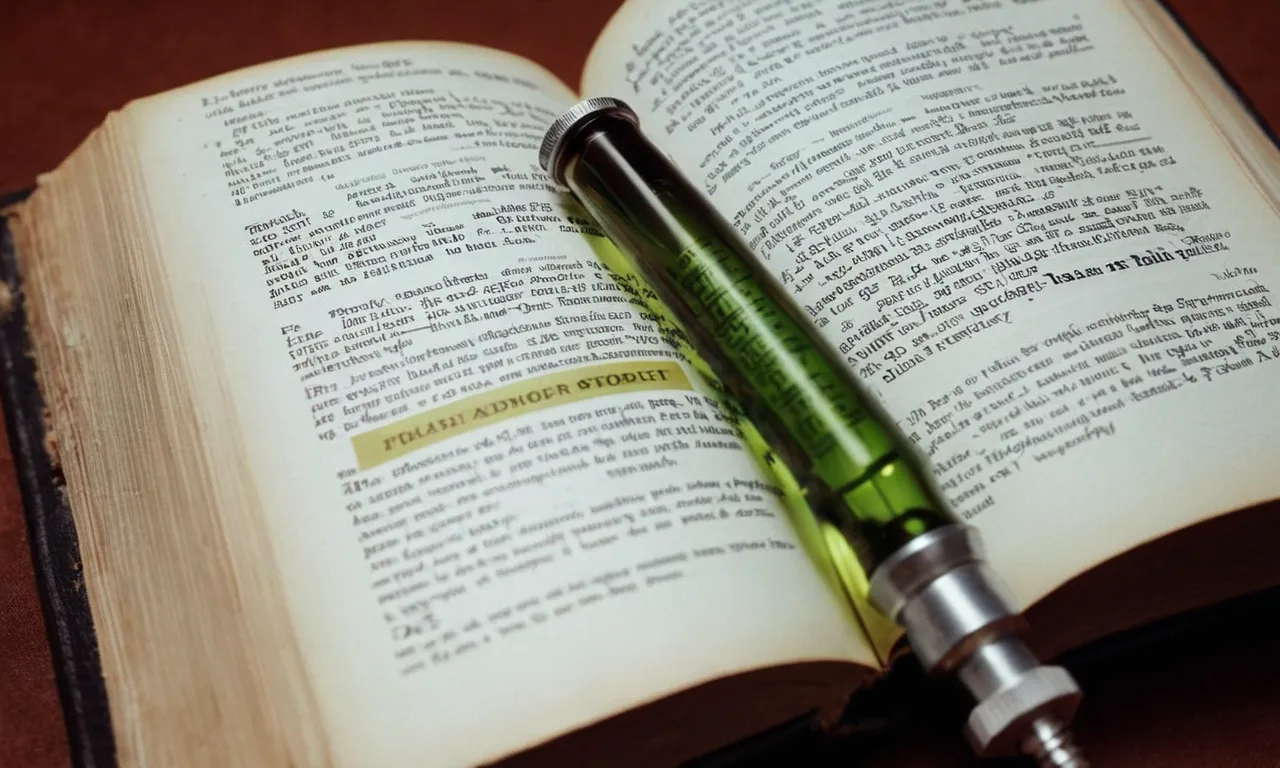What Does The Bible Say About Drugs?
Drug and substance abuse has become a major issue across the world today. Many people, including Christians, struggle with addictions that are not only harmful to their health but can also damage their relationships.
If you’re short on time, here’s a quick answer to your question: The Bible does not directly address drug use. However, it provides principles and stories that indicate drunkenness, addiction, and substance abuse are dangerous and should be avoided.
In this comprehensive article, we will analyze several Bible passages to understand the biblical perspective on drug and substance abuse and addiction. We will examine biblical principles regarding the body as God’s temple, drunkenness, sobriety, and self-control.
Additionally, we will study examples and stories about characters in the Bible who struggled with substance abuse.
The Body as God’s Temple
Taking Care of Our Bodies
The Bible teaches that our bodies are not our own, but rather they belong to God. As 1 Corinthians 6:19-20 explains, “Do you not know that your bodies are temples of the Holy Spirit, who is in you, whom you have received from God? You are not your own; you were bought at a price.
Therefore honor God with your bodies.” This means we have a responsibility to take care of our physical health out of reverence for God.
Part of honoring God with our bodies involves avoiding substance abuse. We should aim to keep our minds clear and our bodies energized to serve God wholeheartedly. As 1 Peter 1:13 encourages, “Therefore, prepare your minds for action; be self-controlled; set your hope fully on the grace to be given you when Jesus Christ is revealed.”
Self-control and sobriety are virtuous in God’s eyes.
We can take care of our bodies by getting sufficient sleep, regular exercise, proper nutrition, and necessary medical treatment. God has designed our bodies to be resilient when cared for properly. As Psalm 139:14 declares, “I praise you because I am fearfully and wonderfully made.”
When we nurture our health, it brings glory to the Creator.
Health Consequences of Drug Abuse
While occasional drug use may seem harmless on the surface, it often leads to chemical dependency and long-term health problems. Substance abuse dishonors God by harming the body He has given us to steward.
For example, heavy alcohol consumption can damage the liver, heart, and brain over time. The CDC reports over 95,000 alcohol-related deaths in the U.S. per year. Smoking tobacco causes lung cancer, chronic obstructive pulmonary disease, and cardiovascular disease.
The CDC attributes over 480,000 annual deaths to cigarette smoking.
Likewise, narcotics like heroin and prescription opioids depress the central nervous system and carry a high risk of overdose death. In 2020, the CDC recorded over 100,000 drug overdose fatalities, with 75% involving opioids.
The health consequences of methamphetamines also include stroke, kidney failure, and psychosis.
Beyond physical health, substance abuse disorders also correlate with increased risk for depression, anxiety, suicide, unemployment, poverty, homelessness, domestic violence, and crime. These societal ills demonstrate how drug abuse can ravage not just individuals, but whole communities.
The Christian approach to health recognizes the dangers of substance abuse and advocates sobriety as a responsibility to God. Our bodies function best when cared for naturally through spiritual disciplines like prayer, fellowship, and obedience to Scripture.
Biblical Principles Regarding Drunkenness and Sobriety
Warnings Against Drunkenness
The Bible contains many warnings against drunkenness, which is the state of being intoxicated by consuming excessive amounts of alcohol. Scripture repeatedly instructs believers to avoid drunkenness and highlights its destructive effects.
For example, Proverbs 20:1 states, “Wine is a mocker, strong drink a brawler, and whoever is led astray by it is not wise.” This verse cautions that overindulging in alcohol clouds judgment and leads people into foolishness.
The apostle Paul also warned the Ephesians, “And do not get drunk with wine, for that is debauchery, but be filled with the Spirit” (Ephesians 5:18). He contrasts being filled with alcohol versus being filled with God’s Spirit, imploring believers to avoid intoxication.
Additionally, 1 Corinthians 6:9-10 includes drunkards in a list of those who will not inherit God’s kingdom, demonstrating that habitual drunkenness is incompatible with a life devoted to God. Overall, the Bible clearly communicates that avoiding drunkenness is wise and honorable.
Calls to Sobriety and Self-Control
Along with warnings against drunkenness, the Bible encourages sobriety, which involves moderation, self-control, and avoiding excessive use of alcohol.
For instance, 1 Peter 5:8 instructs, “Be sober-minded; be watchful. Your adversary the devil prowls around like a roaring lion, seeking someone to devour.” Here, sobriety refers to being spiritually alert and avoiding clouded judgment.
Additionally, Titus 2:2-3 provides guidelines for older members of the church to live self-controlled and sober lives as examples to the younger generations. This emphasis on sober-mindedness underscores that consumption of alcohol should be done in moderation.
Proverbs 31:4-5 also advises kings and rulers, “It is not for kings, O Lemuel, it is not for kings to drink wine, or for rulers to take strong drink, lest they drink and forget what has been decreed and pervert the rights of all the afflicted.”
Here, sobriety is linked to making wise and just decisions.
Stories of Characters Struggling with Substance Abuse
Noah’s Drunkenness (Genesis 9:20-29)
The story of Noah’s drunkenness shows the negative consequences of alcohol abuse. After the Flood, Noah planted a vineyard and made wine. However, he drank too much of it and became drunk, leading him to uncover himself inside his tent (Genesis 9:21).
This was a shameful act that showed Noah’s loss of self-control and wisdom under the influence of alcohol.
The effects went even further – when Noah’s son Ham saw his father’s nakedness, he went and told his brothers about it instead of honoring his father by covering him. As a result, when Noah awoke from his drunkenness and learned what Ham had done, he cursed Ham’s son Canaan – showing the far-reaching family dysfunction that can result from alcohol abuse (Genesis 9:25).
While the Bible permits the moderate enjoyment of alcohol, Noah’s experience serves as a warning against drunkenness and addiction. Just as Noah’s drunkenness had sad consequences for his family dynamics, substance abuse today often leads to broken relationships and trauma.
Lot’s Daughters (Genesis 19:30-38)
Another dramatic Biblical story highlighting the dangers of intoxication involves Lot and his daughters after the destruction of Sodom and Gomorrah. Lot escaped the burning city with his daughters and went to live in a cave (Genesis 19:30).
His daughters, believing that the whole world had been destroyed and there were no men left to marry, hatched a sinful plot – they got their father drunk on wine and had sexual relations with him on two consecutive nights, resulting in pregnancies (Genesis 19:31-36).
This disturbing story illustrates how intoxication impairs moral judgment and leads people to commit acts they would normally avoid. It also shows some of the dysfunction, trauma, and boundary-crossing that can occur in families struggling with addiction.
The resulting offspring from this incestuous encounter, Moab and Ben-Ammi, later became the founders of enemy nations that opposed the Israelites.
Seeking Help for Addictions
Admitting the Problem
The first step to overcoming any addiction is admitting there is a problem. This can be incredibly difficult, as denial is one of the key characteristics of addiction. Admitting an addiction exists means accepting that certain behaviors and choices are causing harm.
However, acknowledging the problem is the only way recovery can begin.
Seeking advice and counsel from friends, family members, pastors, or health professionals can assist in the process of admission. These supportive individuals can provide perspective and help identify signs of addictive behaviors.
Their insights might be just what an addicted person needs to recognize the severity of the problem.
Admitting an addiction also means taking responsibility for choices and behaviors. Blaming other people or external circumstances will only impede the recovery process. Addicts must own their actions before any lasting change can occur.
Relying on God’s Strength
Although overcoming addiction requires human effort, believers must rely on God’s strength and not willpower alone. Scripture promises that God’s power works within Christians to help them live victoriously (Ephesians 3:20).
Therefore, the Holy Spirit empowers people to make wise choices and resist temptation.
Throughout the recovery process, spending time in God’s Word, prayer, worship, fasting, and Christian fellowship provides spiritual strength. Surrounding oneself with supportive believers creates accountability and encouragement.
It is also crucial to remove influences that may contribute to addiction. The Bible teaches that if something causes someone to sin, it is better to remove those influences than to give in to temptation (Matthew 5:29-30). This might require making major lifestyle changes to support recovery.
Additionally, confessing struggles and temptations to a trusted Christian counselor or sponsor allows them to offer prayer and biblical guidance. Sharing vulnerabilities with other believers allows them to speak truth and wisdom into the situation.
Addiction recovery is difficult, but not impossible with God’s help. His word promises that there is always a way of escape from temptation (1 Corinthians 10:13). Relying on Christ’s power brings hope, healing, and freedom.
Providing Support for Those Struggling with Addictions
Showing Grace and Forgiveness
When someone we know struggles with addiction, one of the most compassionate things we can do is show them grace and forgiveness (Galatians 6:1-2). As the Bible teaches, we should gently restore them in a spirit of humility, aware that we too could be tempted.
An attitude of judgment or superiority has no place among followers of Christ.
Pray for God to give you an understanding, forgiving heart when dealing with addicted loved ones. Set healthy boundaries if needed, but let mercy and concern guide your interactions. Get support from other believers so you can continue extending grace over the long haul of addiction recovery.
Praying for and Encouraging Others
Two of the most powerful ways to support those battling addiction are through prayer and encouragement (1 Thessalonians 5:11). Bring their struggles before God, asking Him to deliver them and give them strength.
Speak hope into their lives through uplifting words and small acts of kindness to lighten their burden.
Community support makes overcoming addiction more achievable. Consider starting a support group at your church or volunteering with a Christian addiction ministry. Let God use you to make the road a little smoother for someone fighting for sobriety.
Conclusion
In conclusion, although the Bible does not directly prohibit drug use, it clearly indicates that followers of God should value their health and avoid drunkenness or addiction.
The principles and examples provided give us guidance about avoiding substances that could lead to loss of self-control or damage our bodies.
For those already struggling with addictions, the Bible urges us to humbly admit our weaknesses and rely on God’s strength to overcome. It also instructs Christians to gently restore those battling addictions while showing them grace and forgiveness.







